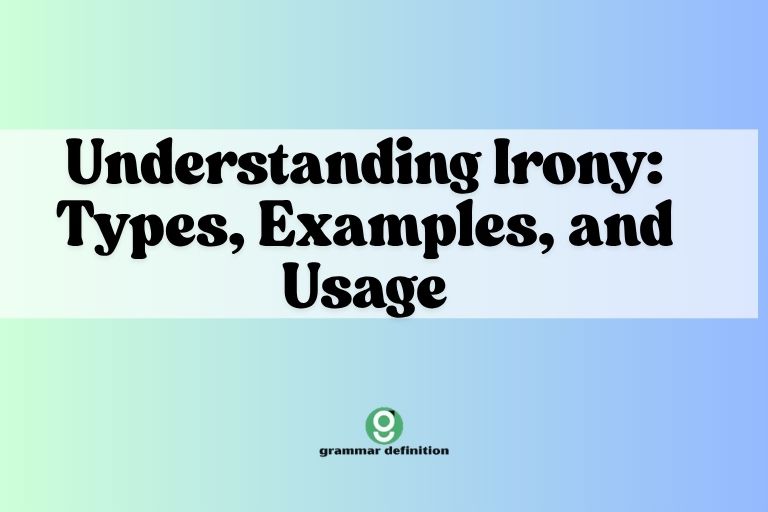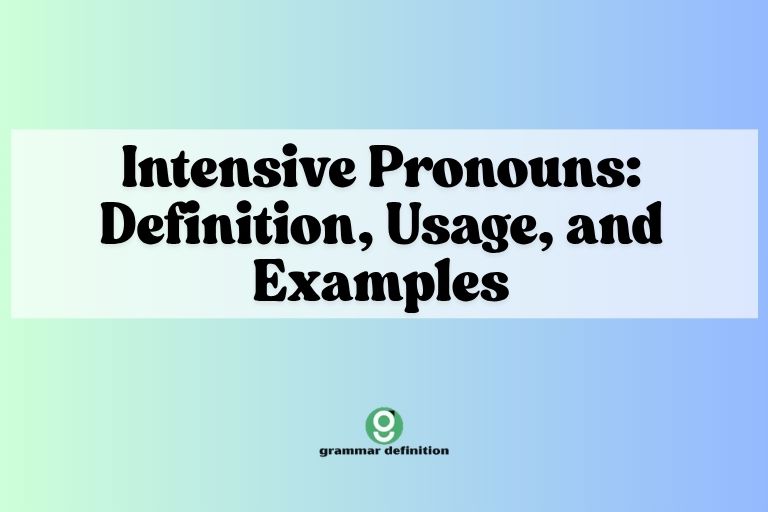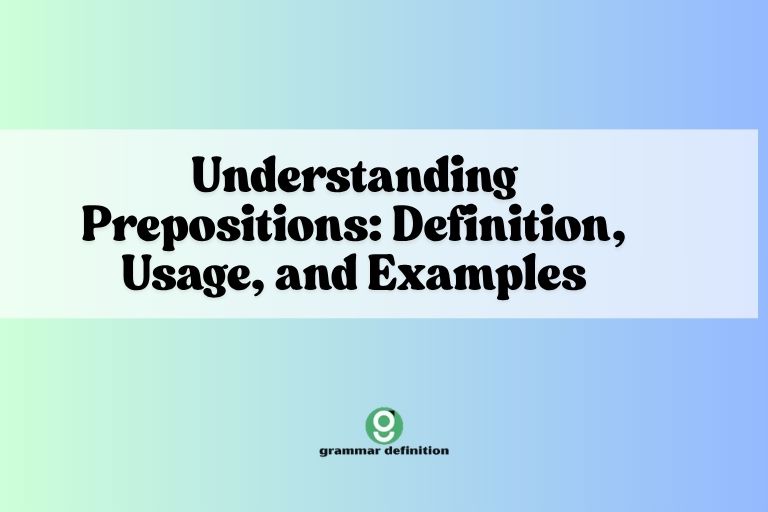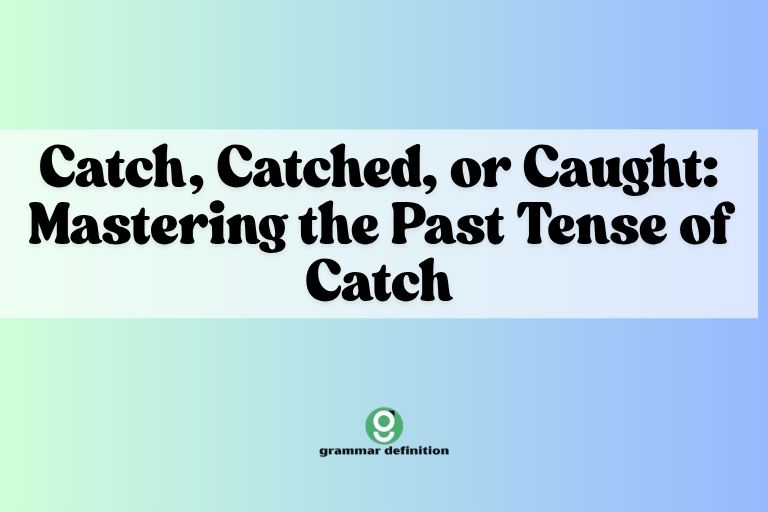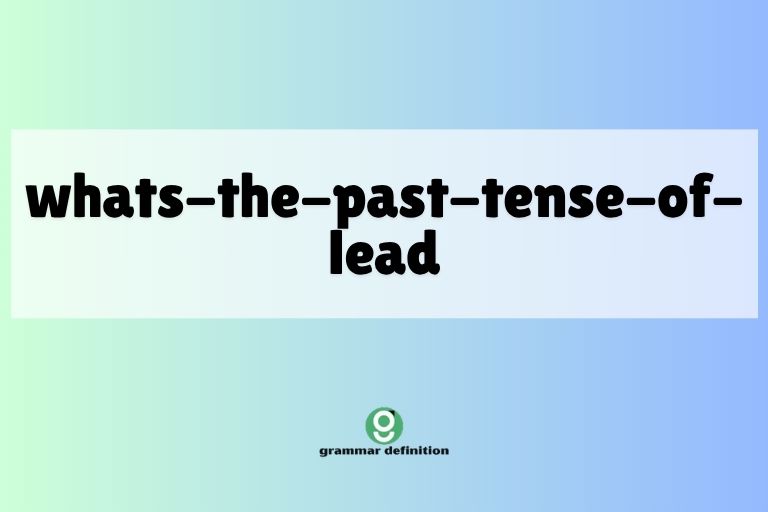Criteria: Singular or Plural? Mastering Its Correct Usage
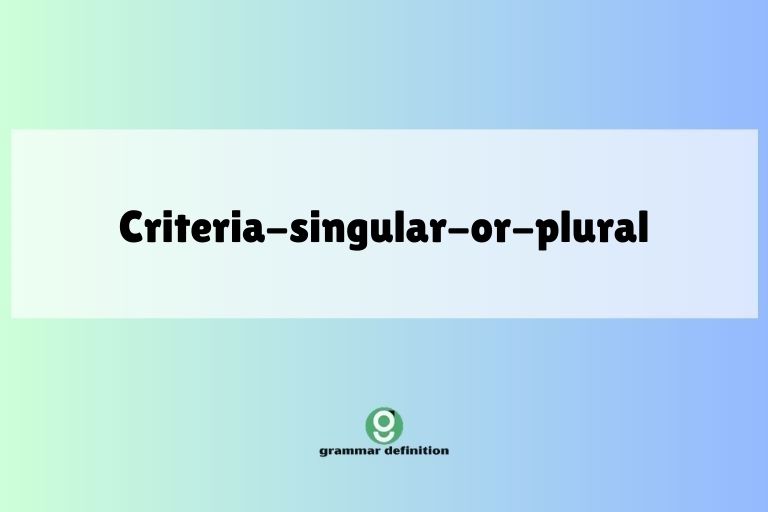
Understanding the proper use of “criteria,” whether it’s singular or plural, is crucial for clear and accurate communication in English. This word, derived from Greek, often causes confusion, even for native speakers.
Mastering its correct usage not only enhances the precision of your writing and speech but also demonstrates a strong command of English grammar. This article is designed for English language learners, students, writers, and anyone who wants to improve their grammatical accuracy and avoid common errors associated with “criteria.” By the end of this guide, you’ll have a solid understanding of when to use “criterion” and when to use “criteria,” along with practical examples and exercises to reinforce your learning.
Whether you are writing academic papers, professional reports, or simply engaging in everyday conversations, using the correct form of “criteria” will make your communication more effective and credible. Let’s dive into the details and unravel the complexities of this often-misunderstood word.
Table of Contents
- Definition of Criterion and Criteria
- Structural Breakdown
- Types and Categories of Criteria
- Examples of Criterion and Criteria in Sentences
- Usage Rules for Criterion and Criteria
- Common Mistakes with Criterion and Criteria
- Practice Exercises
- Advanced Topics: Nuances and Exceptions
- Frequently Asked Questions (FAQ)
- Conclusion
Definition of Criterion and Criteria
The words “criterion” and “criteria” are related but have distinct meanings based on number. Understanding these differences is essential for proper usage.
Let’s explore each term in detail.
Criterion: The Singular Form
Criterion is the singular form of the noun. It refers to a single standard, rule, or test on which a judgment or decision can be based. Think of it as one specific measure or benchmark used for evaluation. The word originates from Greek and maintains its pluralization rules in English.
In essence, when you are referring to just one standard or measure, you should use “criterion.”
Criteria: The Plural Form
Criteria is the plural form of the noun. It refers to a set of standards, rules, or tests used to make a decision or judgment. When you have multiple factors or measures to consider, you use the plural form “criteria.”
For example, if you’re evaluating job applicants based on their experience, education, and skills, you are using multiple “criteria.”
Structural Breakdown
Understanding the structural elements of “criterion” and “criteria” can further clarify their proper usage. Here’s a breakdown of their grammatical roles and patterns.
Grammatical Role
Both “criterion” and “criteria” function as nouns in a sentence. They can act as subjects, objects, or complements.
Their correct usage depends on whether you’re referring to a single standard or multiple standards.
Sentence Patterns
When using “criterion” (singular), the sentence structure will typically reflect a singular subject. For example:
The main criterion for success is hard work.
When using “criteria” (plural), the sentence structure will reflect a plural subject. For example:
The criteria for judging the competition were clearly defined.
Verb Agreement
It’s crucial to ensure verb agreement when using “criterion” and “criteria.” A singular verb should be used with “criterion,” while a plural verb should be used with “criteria.”
Correct: The most important criterion is clarity.
Correct: The most important criteria are clarity and accuracy.
Incorrect: The most important criteria is clarity and accuracy.
Types and Categories of Criteria
Criteria can be categorized based on various contexts and applications. Understanding these categories can help you use the terms more effectively.
Evaluation Criteria
These are standards used to assess the quality, value, or merit of something. They are common in performance reviews, project evaluations, and academic grading.
Example: The evaluation criteria for the project included originality, feasibility, and impact.
Selection Criteria
These are the standards used to choose the best candidate or option from a group. They are frequently used in hiring processes, scholarship applications, and award selections.
Example: The selection criteria for the scholarship were academic excellence, leadership potential, and community involvement.
Diagnostic Criteria
In fields like medicine and psychology, diagnostic criteria are specific symptoms, signs, or test results used to identify a particular condition or disorder.
Example: The diagnostic criteria for depression include persistent sadness, loss of interest, and changes in appetite.
Assessment Criteria
These are the standards used to measure learning outcomes or skills. They are common in education and training programs.
Example: The assessment criteria for the writing assignment included grammar, coherence, and originality.
Examples of Criterion and Criteria in Sentences
To solidify your understanding, let’s look at extensive examples of “criterion” and “criteria” used in various contexts. The following tables provide clear illustrations of their correct usage.
Table 1: Criterion (Singular) Examples
This table showcases the use of “criterion” in sentences where a single standard or measure is being discussed. Notice how the verb agreement remains singular.
| Sentence | Context |
|---|---|
| The primary criterion for judging the art competition was originality. | Art competition |
| A key criterion for success in this role is strong communication skills. | Job requirement |
| The most important criterion for selecting the winner is accuracy. | Contest judging |
| One criterion for admission to the university is a high GPA. | University admission |
| The only criterion he used for choosing a restaurant was the price. | Restaurant choice |
| A crucial criterion for evaluating the research paper is its methodology. | Academic evaluation |
| The sole criterion for entry into the club is a passion for music. | Club membership |
| One important criterion for a good leader is empathy. | Leadership quality |
| The main criterion for the grant application is innovation. | Grant application |
| An essential criterion for a healthy relationship is trust. | Relationship aspect |
| The defining criterion for a classic novel is its enduring appeal. | Literary analysis |
| A significant criterion for a successful product is its marketability. | Product success |
| The fundamental criterion for a stable building is its foundation. | Construction |
| A single criterion for happiness is gratitude. | Personal well-being |
| The overriding criterion for project approval is its cost-effectiveness. | Project management |
| A vital criterion for a reliable car is its fuel efficiency. | Automotive |
| The ultimate criterion for a good movie is its entertainment value. | Film criticism |
| One criterion for a strong democracy is freedom of speech. | Political science |
| The overriding criterion for investment is the potential return. | Finance |
| The strongest criterion for a successful marriage is mutual respect. | Relationship advice |
| A critical criterion for scientific research is reproducibility. | Scientific method |
| The decisive criterion for a promotion at this company is performance. | Corporate advancement |
| The singular criterion for judging this dish is taste. | Culinary competition |
| One criterion for evaluating the design proposal is aesthetics. | Design assessment |
| The primary criterion for publication in the journal is originality. | Academic publishing |
| A fundamental criterion for a just society is equality before the law. | Social justice |
| The most obvious criterion for a good photograph is composition. | Photography |
| A solitary criterion for judging the dance performance was technique. | Dance evaluation |
| The overriding criterion for choosing a vacation destination was relaxation. | Travel planning |
| An important criterion for selecting a pet is compatibility with lifestyle. | Pet ownership |
Table 2: Criteria (Plural) Examples
This table demonstrates the use of “criteria” in sentences where multiple standards or measures are being considered. Note the plural verb agreement.
| Sentence | Context |
|---|---|
| The main criteria for judging the art competition were originality and technique. | Art competition |
| The criteria for success in this role include strong communication skills and leadership abilities. | Job requirement |
| The most important criteria for selecting the winner are accuracy and creativity. | Contest judging |
| The criteria for admission to the university include a high GPA and strong letters of recommendation. | University admission |
| The criteria he used for choosing a restaurant were price and ambiance. | Restaurant choice |
| The crucial criteria for evaluating the research paper are its methodology and findings. | Academic evaluation |
| The criteria for entry into the club are a passion for music and a willingness to participate. | Club membership |
| Important criteria for a good leader are empathy and vision. | Leadership quality |
| The main criteria for the grant application are innovation and feasibility. | Grant application |
| Essential criteria for a healthy relationship are trust and communication. | Relationship aspect |
| The defining criteria for a classic novel are its enduring appeal and thematic depth. | Literary analysis |
| Significant criteria for a successful product are its marketability and usability. | Product success |
| The fundamental criteria for a stable building are its foundation and structural integrity. | Construction |
| Simple criteria for happiness are gratitude and mindfulness. | Personal well-being |
| The overriding criteria for project approval are its cost-effectiveness and potential impact. | Project management |
| Vital criteria for a reliable car are its fuel efficiency and safety features. | Automotive |
| The ultimate criteria for a good movie are its entertainment value and artistic merit. | Film criticism |
| Important criteria for a strong democracy are freedom of speech and fair elections. | Political science |
| The key criteria for investment are the potential return and risk assessment. | Finance |
| The strongest criteria for a successful marriage are mutual respect and shared values. | Relationship advice |
| Critical criteria for scientific research are reproducibility and validity. | Scientific method |
| The decisive criteria for a promotion at this company are performance and teamwork. | Corporate advancement |
| The essential criteria for judging this dish are taste and presentation. | Culinary competition |
| The important criteria for evaluating the design proposal are aesthetics and functionality. | Design assessment |
| The primary criteria for publication in the journal are originality and significance. | Academic publishing |
| Fundamental criteria for a just society are equality before the law and access to opportunities. | Social justice |
| The most obvious criteria for a good photograph are composition and lighting. | Photography |
| Simple criteria for judging the dance performance were technique and artistry. | Dance evaluation |
| The overriding criteria for choosing a vacation destination were relaxation and affordability. | Travel planning |
| Important criteria for selecting a pet are compatibility with lifestyle and temperament. | Pet ownership |
Table 3: Examples Highlighting Verb Agreement
This table emphasizes the importance of verb agreement with “criterion” and “criteria.” Pay close attention to how the verb changes based on whether the subject is singular or plural.
| Sentence | Singular/Plural | Verb Agreement |
|---|---|---|
| The most important criterion is clarity. | Singular | Singular (is) |
| The most important criteria are clarity and accuracy. | Plural | Plural (are) |
| One criterion for success is dedication. | Singular | Singular (is) |
| The main criteria for success include dedication and hard work. | Plural | Plural (include) |
| Each criterion has its own weight in the evaluation. | Singular | Singular (has) |
| All criteria have been carefully considered. | Plural | Plural (have) |
| A key criterion was the candidate’s experience. | Singular | Singular (was) |
| The key criteria were the candidate’s experience and education. | Plural | Plural (were) |
| The final criterion is the interview performance. | Singular | Singular (is) |
| The final criteria are the interview performance and references. | Plural | Plural (are) |
| The primary criterion remains the quality of the work. | Singular | Singular (remains) |
| The primary criteria remain the quality and originality of the work. | Plural | Plural (remain) |
| The fundamental criterion is understanding the basics. | Singular | Singular (is) |
| The fundamental criteria are understanding the basics and applying them correctly. | Plural | Plural (are) |
| One criterion that she used was intuition. | Singular | Singular (was) |
| The criteria that he used were experience and skillset. | Plural | Plural (were) |
| The overriding criterion has always been customer satisfaction. | Singular | Singular (has been) |
| The overriding criteria have always been customer satisfaction and product quality. | Plural | Plural (have been) |
| The decisive criterion is whether he can deliver results. | Singular | Singular (is) |
| The decisive criteria are whether he can deliver results and lead a team effectively. | Plural | Plural (are) |
Usage Rules for Criterion and Criteria
To ensure correct usage of “criterion” and “criteria,” follow these rules:
Rule 1: Singular vs. Plural
Use “criterion” when referring to a single standard or measure. Use “criteria” when referring to multiple standards or measures.
Rule 2: Verb Agreement
Ensure that the verb agrees with the subject. Use a singular verb with “criterion” and a plural verb with “criteria.”
Rule 3: Context Matters
The context of your sentence will determine whether you need the singular or plural form. Always consider what you are actually referring to – one standard or multiple standards.
Rule 4: Avoid Redundancy
Avoid using phrases like “a criteria.” Since “criteria” is already plural, using the article “a” is incorrect. Instead, use “a criterion” for the singular form.
Rule 5: Formal vs. Informal Usage
While some people might use “criteria” as a singular term in informal settings, it is grammatically incorrect. In formal writing and speech, adhere to the correct singular and plural forms.
Common Mistakes with Criterion and Criteria
Many errors occur when using “criterion” and “criteria.” Here are some common mistakes and how to correct them:
Mistake 1: Using “criteria” as Singular
Incorrect: The main criteria for success is hard work.
Correct: The main criterion for success is hard work.
Explanation: “Criterion” should be used because we are referring to a single standard.
Mistake 2: Using “a criteria”
Incorrect: A criteria for selection is experience.
Correct: A criterion for selection is experience.
Explanation: “Criteria” is plural and therefore cannot be preceded by the singular article “a.”
Mistake 3: Incorrect Verb Agreement
Incorrect: The criteria for judging is originality and technique.
Correct: The criteria for judging are originality and technique.
Explanation: The plural subject “criteria” requires the plural verb “are.”
Table 4: Correct vs. Incorrect Examples
This table highlights common mistakes and their corrections, providing a clear comparison to help you avoid these errors.
| Incorrect | Correct | Explanation |
|---|---|---|
| The main criteria is originality. | The main criterion is originality. | “Criteria” is plural; use “criterion” for singular. |
| A criteria for judging was fairness. | A criterion for judging was fairness. | “Criteria” is plural; use “criterion” for singular after “a.” |
| The important criteria is clear. | The important criteria are clear. | Plural subject “criteria” needs plural verb “are.” |
| Each criteria has its own weight. | Each criterion has its own weight. | “Criteria” is plural; use “criterion” for singular with “each.” |
| One of the criteria is difficult to meet. | One of the criteria are difficult to meet. | This is one of the exceptions, one of the criteria is acceptable, but one of the criteria are is also correct. |
| The only criteria for selection were experience. | The only criterion for selection was experience. | “Criteria” is plural; use “criterion” for singular with “only.” |
| The key criteria was innovation and impact. | The key criteria were innovation and impact. | Plural subject “criteria” needs plural verb “were.” |
| Final criteria is the overall impression. | The final criterion is the overall impression. | “Criteria” is plural; use “criterion” for singular with “the.” |
| The decisive criteria has been identified. | The decisive criteria have been identified. | Plural subject “criteria” needs plural verb “have.” |
| The overriding criteria is cost-effectiveness. | The overriding criterion is cost-effectiveness. | “Criteria” is plural; use “criterion” for singular with “the overriding.” |
| A basic criteria for success are dedication. | A basic criterion for success is dedication. | “Criteria” is plural; use “criterion” for singular with “a basic.” |
| The primary criteria includes quality and relevance. | The primary criteria include quality and relevance. | Plural subject “criteria” needs plural verb “include.” |
| The singular criteria was taste. | The singular criterion was taste. | “Criteria” is plural; use “criterion” for singular with “the singular.” |
| An essential criteria is trust and respect. | Essential criteria are trust and respect. | Plural subject “criteria” needs plural verb “are.” |
| The critical criteria involves reliability. | The critical criteria involve reliability. | Plural subject “criteria” needs plural verb “involve.” |
| Each of the criteria requires careful thought. | Each of the criteria require careful thought. | Plural subject “criteria” needs plural verb “require.” |
| The main criteria for the job is experience. | The main criterion for the job is experience. | “Criteria” is plural; use “criterion” for singular with “the main.” |
| The important criteria has been met. | The important criteria have been met. | Plural subject “criteria” needs plural verb “have been.” |
| The decisive criteria was performance and potential. | The decisive criteria were performance and potential. | Plural subject “criteria” needs plural verb “were.” |
| The overall criteria is the final decision. | The overall criterion is the final decision. | “Criteria” is plural; use “criterion” for singular with “the overall.” |
Practice Exercises
Test your understanding with these practice exercises. Choose the correct form, “criterion” or “criteria,” for each sentence.
Exercise 1: Fill in the Blanks
Complete the following sentences with either “criterion” or “criteria.”
| Question | Answer |
|---|---|
| 1. The main __________ for judging the contest was creativity. | criterion |
| 2. The __________ for selecting the scholarship recipients included academic excellence and community service. | criteria |
| 3. What __________ did you use to make your decision? | criteria |
| 4. A key __________ for a successful project is thorough planning. | criterion |
| 5. The evaluation __________ included both quantitative and qualitative measures. | criteria |
| 6. Is there a specific __________ that applicants must meet? | criterion |
| 7. The __________ for assessing the research proposal were clearly defined. | criteria |
| 8. One __________ for a good leader is the ability to inspire others. | criterion |
| 9. The admission __________ for the university are very competitive. | criteria |
| 10. The primary __________ for this job is experience in the field. | criterion |
Exercise 2: Correct the Sentences
Identify and correct the errors in the following sentences.
| Question | Corrected Answer |
|---|---|
| 1. The main criteria is to have good communication skills. | The main criterion is to have good communication skills. |
| 2. A criteria for success are hard work. | A criterion for success is hard work. |
| 3. The important criteria is clearly defined. | The important criteria are clearly defined. |
| 4. Each criteria has its own value. | Each criterion has its own value. |
| 5. One criteria for selection were leadership qualities. | One criterion for selection was leadership qualities. |
| 6. The only criteria for entry was a valid ID. | The only criterion for entry was a valid ID. |
| 7. The key criteria was innovation and creativity. | The key criteria were innovation and creativity. |
| 8. The final criteria is the overall impression. | The final criterion is the overall impression. |
| 9. The decisive criteria has been identified. | The decisive criteria have been identified. |
| 10. The overriding criteria is cost-effectiveness and efficiency. | The overriding criteria are cost-effectiveness and efficiency. |
Advanced Topics: Nuances and Exceptions
For advanced learners, understanding the nuances and exceptions related to “criterion” and “criteria” can further refine their usage.
Formal vs. Informal Language
In very informal speech, some native speakers might occasionally use “criteria” as a singular noun. However, this is grammatically incorrect and should be avoided in formal writing and professional settings.
Always adhere to the correct singular form “criterion” in formal contexts.
“One of the Criteria”
The phrase “one of the criteria” can sometimes be confusing. While “criteria” is plural, the phrase focuses on one item from a set of criteria.
In such cases, either singular or plural verb agreement can be acceptable, but the singular form is more common.
Acceptable: One of the criteria is difficult to meet.
Acceptable: One of the criteria are difficult to meet.
Compound Nouns
Sometimes, “criterion” can be part of a compound noun, further specifying the type of standard being referred to. For example:
The selection criterion was clearly defined.
Frequently Asked Questions (FAQ)
Here are some frequently asked questions about “criterion” and “criteria” to address common points of confusion.
- Q: Is “criteria” ever singular?
A: No, “criteria” is always plural. The singular form is “criterion.” Using “criteria” as a singular noun is grammatically incorrect, especially in formal writing. - Q: Can I say “a criteria”?
A: No, you cannot say “a criteria.” Since “criteria” is plural, it cannot be used with the singular article “a.” The correct phrase is “a criterion.” - Q: What is the origin of the word “criterion”?
A: The word “criterion” comes from Greek, where it originally meant “a standard for judging.” It retains its Greek pluralization in English, hence “criteria.” - Q: How do I remember when to use “criterion” vs. “criteria”?
A: Think of “criterion” as referring to a single item, like “one criterion.” Think of “criteria” as referring to multiple items, like “a set of criteria.” - Q: Is it acceptable to use “criteria” as singular in informal speech?
A: While some native speakers might do this in very informal contexts, it is grammatically incorrect. It’s best to avoid using “criteria” as singular, especially in formal situations. - Q: What verb tense should I use with ‘criterion’ and ‘criteria’?
A: You should use a verb tense that agrees with the number of the subject. For ‘criterion’ (singular), use a singular verb (e.g., ‘is’, ‘was’, ‘has’). For ‘criteria’ (plural), use a plural verb (e.g., ‘are’, ‘were’, ‘have’). - Q: Is there a difference between “criterion” and “standard”?
A: While “criterion” and “standard” are similar, “criterion” is often used in more formal or technical contexts to refer to a specific rule or measure for judgment, whereas “standard” can refer to a more general level of quality or expectation. - Q: How do I correct a sentence where I’ve mistakenly used “criteria” as singular?
A: Replace “criteria” with “criterion” and ensure that the verb agreement is corrected to match the singular subject. For example, change “The main criteria is…” to “The main criterion is…”
Conclusion
Mastering the correct usage of “criterion” and “criteria” is essential for clear and accurate communication in English. By understanding the difference between the singular and plural forms, following the usage rules, and avoiding common mistakes, you can significantly improve your grammatical accuracy.
Remember that “criterion” refers to a single standard, while “criteria” refers to multiple standards. Pay attention to verb agreement and always consider the context of your sentence.
Continue to practice with examples and exercises to reinforce your learning. With consistent effort, you’ll be able to use “criterion” and “criteria” confidently and correctly in any situation.
Accurate grammar enhances your credibility and ensures that your message is understood clearly and effectively. Keep practicing, and you’ll master this important aspect of English grammar!


